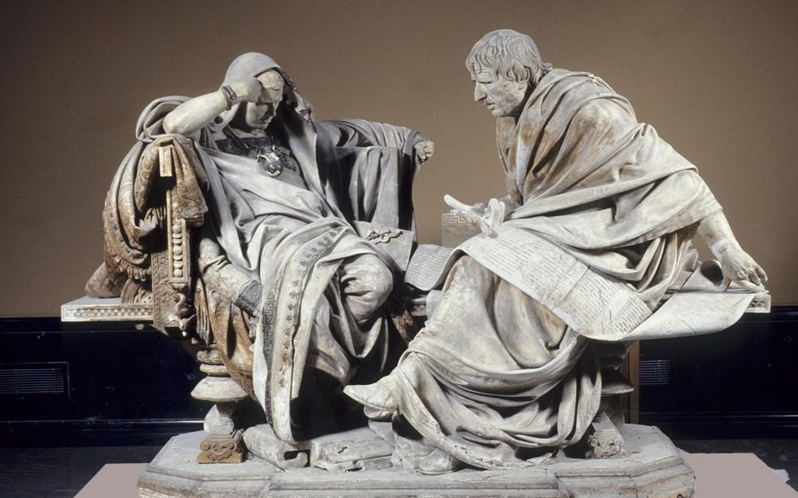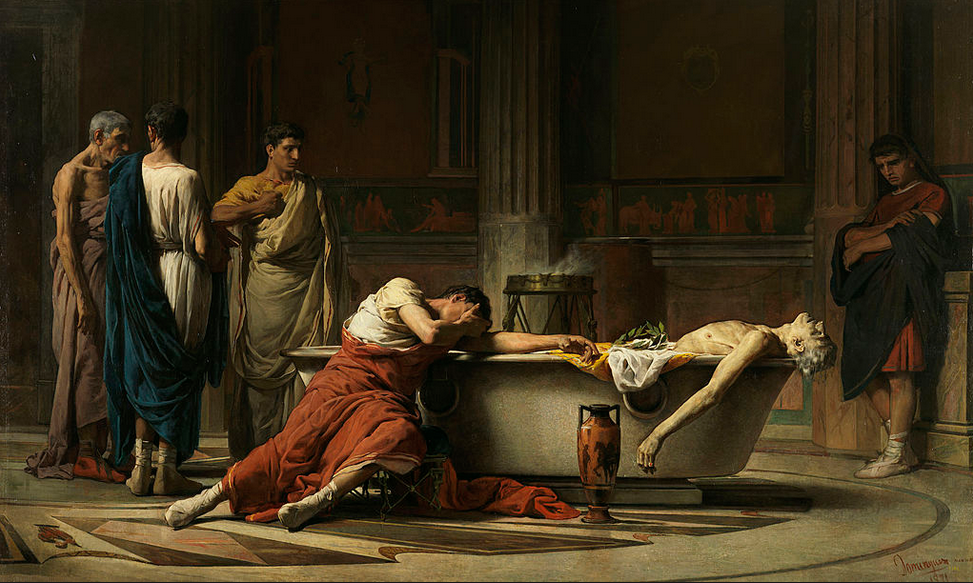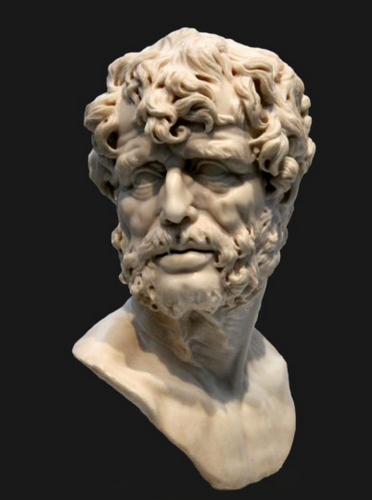Editor’s note: The following is extracted from Famous Men of Ancient Times, by S. G. Goodrich (published 1843). All spelling in the original.
This individual, whose “Morals” are so familiar to us, was born at Corduba, in Spain, six years before Christ. His father was a rhetorician of some celebrity, and a portion of his works has come down to our time. While Lucius was yet a child, he removed from Corduba to Rome, which henceforward became his residence. The son, possessing very promising talents, received the greatest care and attention in respect to his education. He was taught eloquence by his father, and took lessons in philosophy from the most celebrated masters. According to the custom of those who sought to excel in wisdom and knowledge, he travelled in Greece and Egypt, after completing his studies, and his work entitled Quæstiones Naturales showed that he made good use of his opportunities during this excursion; it also proves that he was master of the science of his time.
Young Seneca was fascinated with the philosophical speculations of the Stoics,[1] to which sect he became devoted. He even adopted the austere modes of life they inculcated, and refused to eat the flesh of animals; but when the emperor, Tiberius,[2] threatened to punish some Jews and Egyptians for abstaining from certain meats, at the suggestion of his father, he departed from this singularity. In compliance with his father’s advice, who urged upon him the necessity of devoting himself to some kind of business, he adopted the profession of an advocate.
As a pleader, Seneca appeared to great advantage, and consequently excited the envy of Caligula, who aspired to the reputation of an orator. Apprehensive of the consequences, he changed his views, and became a candidate for the honors and offices of the state. He was made prætor, under Claudius, but, being charged with a shameful intrigue with a lady of rank, he was banished to Corsica. Though his guilt was not satisfactorily proved, he continued for five years in exile; during which period he wrote a treatise on Consolation. In this, he seems to draw contentment and peace from philosophical views, and one would fancy that he was elevated by these, above the evils of his condition. Yet, unhappily for his reputation in respect to consistency and sincerity, history tells us that, at this period, he was suing to the emperor in the most abject terms for restitution.
Claudius [3] at length married Agrippina, and Seneca, being recalled, was made preceptor of Nero, the son of Agrippina, who was destined to become emperor. From the favorable traits of character displayed by the pupil of the philosopher in the early part of his career, it might seem that Seneca’s instructions had exerted a good influence over him. But an impartial scrutiny of the events of that period has led to the probable conclusion that he was a pander to the worst of Nero’s vices. It is certain that he acquired immense wealth in a short period of time, and it appears that this was obtained through the munificence of his royal patron. The latter was avaricious and mercenary, and was likely to part with his money only for such things as ministered to his voluptuous passions.
The possessions of Seneca were enormous. He had several gardens and villas in the country, and a magnificent palace in Rome. This was sumptuously furnished, and contained five hundred tables of cedar, with feet of ivory, and all of exquisite workmanship. His ready cash amounted to about twelve millions of dollars. It appears certain that such riches could not have been acquired by means of Seneca’s precepts; and the inference of many of his contemporaries, as well as of posterity, has been, that the virtue which appears so lovely in his pages was but the decorous veil of avarice, vice, and crime.

For a period after his accession to the throne, Nero’s conduct was deserving of praise; but he soon threw off all regard even to decency, and launched forth upon that career which has made his name a by-word and reproach for all after time. Seneca, being accused of having amassed immense wealth by improper means, became greatly alarmed; for he knew the tyrant so well as to foresee that, under color of this charge, he was very likely to sacrifice him, in order to obtain his property. Pretending, therefore, to be indifferent to riches, he begged the emperor to accept of his entire fortune, and permit him to spend the remainder of his days in the quiet pursuits of philosophy. The emperor, with deep dissimulation, refused this offer—no doubt intending in some other way to compass the ruin of Seneca.
Aware of his danger, the philosopher now kept himself at home for a long period, as if laboring under disease. Some time after, a conspiracy for the murder of Nero, headed by Piso, was detected. Several of the most noble of the Roman senators were concerned, and Seneca’s name was mentioned as an accessory. Nero, doubtless glad of an opportunity to sacrifice him, now sent a command that he should destroy himself.
It has been a question whether Seneca was really concerned in the conspiracy of Piso. The proof brought against him was not indeed conclusive, but it is obvious that his position might lead him to desire the death of the tyrant, as the only means of safety to himself; and Seneca’s character, unfortunately, is not such as to shield his memory against strong suspicion of participation in the alleged crime.
Seneca was at table, with his wife, Paulina, and two of his friends, when the messenger of Nero arrived. He heard the words which commanded him to take his own life, with philosophic firmness, and even with apparent joy. He observed that such a mandate might long have been expected from a man who had murdered his own mother and assassinated his best friends. He wished to dispose of his possessions as he pleased, but his request was refused. When he heard this, he turned to those around who were weeping at his fate, and told them, that, since he could not leave them what he believed his own, he would leave them at least his own life for an example—an innocent conduct, which they might imitate, and by which they might acquire immortal fame.
Against their tears and wailings, he exclaimed with firmness, and asked them whether they had not learned better to withstand the attacks of fortune and the violence of tyranny. As for his wife, he attempted to calm her emotions, and when she seemed resolved to die with him, he said he was glad to have his example followed with so much constancy. Their veins were opened at the same moment; but Nero, who was partial to Paulina, ordered the blood to be stopped, and her life was thus preserved.

Seneca’s veins bled but slowly, and the conversation of his dying moments was collected by his friends, and preserved among his works. To hasten his death, he drank a dose of poison, but it had no effect, and therefore he ordered himself to be carried to a hot bath, to accelerate the operation of the draught, and to make the blood flow more freely. This was attended with no better success, and, as the soldiers were clamorous, he was carried into a stove, and suffocated by the steam. Thus he died, in the 66th year of the Christian era.
The death of Seneca has been loudly applauded, and has sometimes been pronounced sublime; but this is owing to an ignorance of the time, and inattention to Seneca’s own doctrines. With the Stoics, death was nothing; “It is not an evil, but the absence of all evil.” This was their creed. With such principles, there could be no fear of death, and consequently, we find that courage to die—if it be courage to encounter that which is not an evil—was common in Seneca’s time. “At that period of languor and luxury,” says M. Nisard, “of monstrous effeminacies, of appetites for which the world could hardly suffice—of perfumed baths, of easy and disorderly intrigues, there were daily men of all ranks, of all fortunes, of all ages, who released themselves from their evils by death. How was it possible for them to avoid suicide, with no other consolation than the philosophy of Seneca, and his theories on the delights of poverty?
“Marcellinus[4] is attacked with a painful but curable malady. He is young, rich, has slaves, friends, everything to make life pleasant: no matter, he conceives the fancy of the pleasure of dying. He assembles his friends; he consults them as if he were going to marry. He discusses with them his project of suicide, and puts it to the vote. Some advise him to do as he pleases; but a Stoic, a friend of Seneca’s, then present, exhorts him bravely to die. His principal reason is that he is ennuyé. No one contradicts the Stoic. Marcellinus thanks his friends, and distributes money to his slaves. He abstains for three days from all food, and is then carried into a warm bath, where he quickly expires, having muttered some words on the pleasure he felt in dying.
“This pleasure was so little of an affectation, so much had it become the fashion, that some of the austere Stoics thought themselves bound to place certain restrictions upon it. They committed suicide from ennui, from idleness, from want of patience to cure themselves of their ills,—for distraction—much in the same way that they killed each other in duels, under Cardinal Richelieu.”
Viewed in this light, Seneca’s death had nothing in it of the sublime: he yielded but to a fashion; he only practised what was common. If he sincerely believed his professed creed—that death is the absence of all evil—he neither evinced courage nor dignity; if he did not believe, then his conduct displayed but the skilful acting of a part, and under circumstances which mark him with the deepest hypocrisy.
It is impossible to deny that Seneca’s works are full of wisdom, though they fall far short of the Christian’s philosophy. In his treatise upon benefits, for example, we have the following passage:—
“The good will of the benefactor is the fountain of all benefits; nay, it is the benefit itself, or, at least, the stamp that makes it valuable and current. Some there are, I know, that take the matter for the benefit, and tax the obligation by weight and measure. When anything is given them, they presently cast it up—’What may such a house be worth? such an office? such an estate?’ as if that were the benefit which is only the sign and mark of it, for the obligation rests in the mind, not in the matter; and all those advantages which we see, handle, or hold in actual possession, by the courtesy of another, are but several modes or ways of explaining and putting the good will in execution. There needs no subtlety to prove that both benefits and injuries receive their value from the intention, when even brutes themselves are able to decide this question. Tread upon a dog by chance, or put him in pain upon the dressing of a wound, the one he passes by as an accident, and the other, in his fashion, he acknowledges as a kindness. But offer to strike at him—though you do him no hurt at all—he flies in the face of you, even for the mischief that you barely meant him.”
This is all just and true: it makes the heart the seat of moral action, and thus far coincides with the Christian’s philosophy. But if there be nothing after death, what sanction has virtue? It may be more beautiful than vice, and consequently preferable, just as a sweet perfume is more desirable than an offensive odor. It is good taste, therefore, to be virtuous. Still, each individual may choose for himself, and without future responsibility, for all alike must share the oblivion of the tomb. The insufficiency of this philosophy to ensure virtue, is attested by the life of Seneca, as well as that of most of his sect. It resulted in the grossest hypocrisy; an ostentation of virtue, covering up the practice of vice.
___________________________________
For a brief period, Rome now enjoyed prosperity and peace; but the young emperor soon became proud, cruel and corrupt. He caused a temple to be erected to himself, and had his own image set in the place of Jupiter and the other deities. He often amused himself by putting innocent people to death; he attempted to famish Rome, and even wished that the Romans had one head, that he might strike it off at a blow! At last, weary of his cruelties, several persons formed a conspiracy and murdered him, A. D. 41. History does not furnish another instance of so great a monster as Caligula.










3